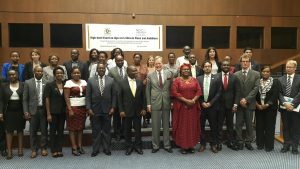 Kampala, June 26 – The GGGI Uganda team joined other development partners to support Uganda’s Nationally Determined Contributions (NDC) Partnership Plan 2018 – 2020. This was during a High-level Event officiated today by Uganda’s 1st Deputy Prime Minister, General Moses Ali at the Serena Hotel in Kampala, who re-echoed the political commitment and pledged governments support for the implementation of the NDCs.
Kampala, June 26 – The GGGI Uganda team joined other development partners to support Uganda’s Nationally Determined Contributions (NDC) Partnership Plan 2018 – 2020. This was during a High-level Event officiated today by Uganda’s 1st Deputy Prime Minister, General Moses Ali at the Serena Hotel in Kampala, who re-echoed the political commitment and pledged governments support for the implementation of the NDCs.
Uganda is the first African country to come up with a National NDC partnership Plan. The plan was developed through a participatory process by the government, the private sector, development partners and non-state actors. The partnership plan outlines five outcome areas.
- Outcome 1: Efficient, operational and gender-responsive policy and institutional framework for the effective governance of climate change in Uganda strengthened;
- Outcome 2: Financing for climate change increased and reflected in relevant planning and budgeting frameworks at national and local levels;
- Outcome 3: Effective and institutionalized measurement, reporting and verification (MRV) systems system that monitors GHG emissions and gender responsive adaptation measures;
- Outcome 4: Strengthened capacity of government officials, civil society, private sector and academia to effectively integrate NDC-SDGs commitment with a gender lens into existing and future programs;
- Outcome 5: Project financing for NDC implementation accelerated Effective governance in Uganda.
The NDC Partnership plan is based on Uganda’s NDCs focused on the following sectors; Agriculture, and Livestock; Forestry, Infrastructure (with an emphasis on human settlements, social infrastructure and transport), Water, energy and Health
The event was attended by over 100 representatives from Government Ministries, Departments and Agencies (MDAs); Parliamentary Forum on Climate Change; Representatives from the Development Partners, Civil Society Organizations, Private sector, Non-Government organizations and representatives from the media
The 15 partners that committed to support the implementation of the NDC partnership plan include; the Global Green Growth Institute (GGGI); Governments of Sweden, the Kingdom of the Netherlands, Germany, France and Austria; United Nations Development Program (UNDP); the African Development Bank; the World Bank; the European Union; United Nations Framework Convention on Climate Change(UNFCCC) Regional Center; the Food and Agriculture Organization of the UN (FAO); Environmental Management for Livelihood Improvement Bwaise Facility (EMLI); Conservation International; International Union for Conservation of Nature (IUCN); National Adaptation Plan – Global Network (NAP-GN); and World Resources Institute.
The GGGI Uganda Country Representative, Peter Okubal spoke on behalf of GGGI committed to provide technical support in Green Finance mobilization; support to the establishment of Effective and Institutionalized MRV System and support with the development of a portfolio of nationally prioritized projects developed for various sources of funding for NDC priority sectors especially agriculture, energy, water and Infrastructure -Transport).
In his welcome remarks, Hon. Sam Cheptoris Minister Water and Environment (MWE), said that for mitigation, Uganda is to focus on implementation of a series of policies and measures in the energy supply, forestry and wetland sectors. In the business-as-usual (BAU) scenario the estimated emissions in 2030 will be 77.3 Million tons of carbon dioxide equivalent per year (MtCO2eq/yr). He noted that the estimated potential cumulative impact of the policies and measures could result in approximately 22% reduction of national greenhouse gas emissions in 2030 compared to business-as-usual. Uganda proposes to implement the identified policies and measures, and their impact may be higher or lower than these estimations illustrate. By 2030 Uganda will have got some results although the full implementation of the priority adaptation and mitigation strategies in the NDC is conditional on accessing significant external support of 70% which is dependent of international support. The Honorable minister emphasized that the government is committed to address climate change and share part of the progress on climate actions with stakeholders. The MWE has been boosted with capacity to track GHG emissions capacity is still needed at sector level.
The event was also addressed by the Chairman of the Parliamentary Forum on Climate Change Hon Biyika Lawrence Songa, the Chairperson of the National Planning Authority (NPA) Dr. Wilberforce Kisamba Mugerwa and Dr. Pablo Vieira, the Global Director of the NDC Partnership Support Unit.
Through the Partnership Plan, Uganda has been able to set timeline to achieve several NDC actions sooner. Uganda seeks to mainstream climate resilience across sectors and develop early warning systems and robust monitoring systems by 2020, much earlier than originally planned. The Plan will create an enabling environment for the country’s NDC by elaborating and clarifying actions for transformational change as the country grows and develops into the future.